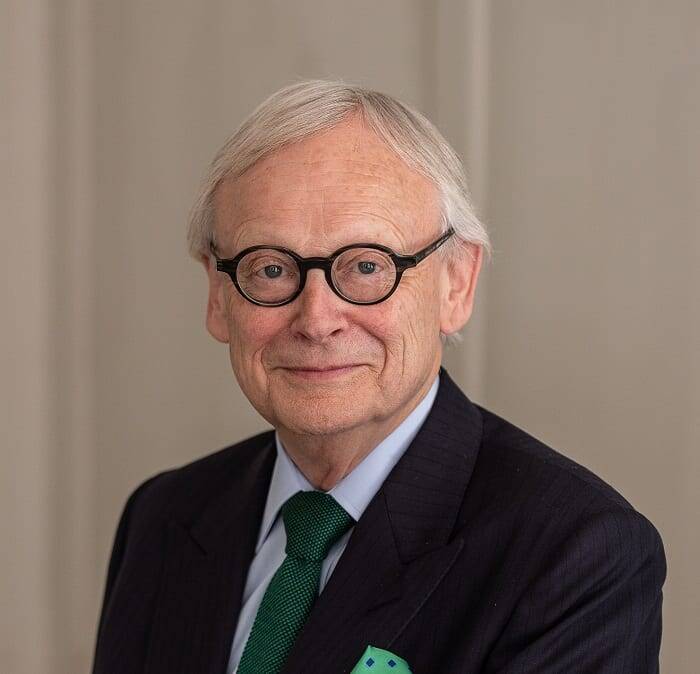This is the Sponsored paywall logged out

Utilities must work harder on relationships with customers if they are to take them on the net-zero journey, chair of the Committee on Climate Change Lord Deben, tells Suzanne Heneghan
Environment champion Lord Deben believes utilities must connect far more with their customers if the sector is to play its part in halting climate change.

Speaking ahead of Utility Week’s New Deal for Utilities Debate this month, the chairman of the Committee on Climate Change (CCC), which called on government to set a 2050 net-zero target for carbon emissions, said influencing future customer behaviour was now vital.
Yet before industry can hope to persuade consumers of this, he believes it must work far harder at engaging with them. “Utilities have an important role and an important connection with the customer, to explain to them why they are doing things and why certain things are better than other things.
“In other words, that they are a very important communications channel.”
The two key discussion areas at the Westminster debate will be climate change and trust. The first will explore how net zero is the new challenge for utilities, impacting operations at every level. The second, fairness and trust, will look at how industry might reverse the dim, populist view plaguing the sector, which has allowed the nationalisation debate to gain traction.
Lord Deben said while many delegates would be expecting him to hone in straight away on climate issues, his initial message to utilities would be about delivering better customer engagement and service, without which there is little hope of them getting people to join them on the critical decarbonisation journey ahead.
“It seems to me, that is the fundamental issue. If you can’t get your connection right with your customer then not only does that do you harm, it also means you can’t do for me what I want you to do – which is to help your customer understand about climate change. Because they haven’t got a connection with you, except one of annoyance.”
Launched in January, Utility Week’s eight-week New Deal for Utilities campaign explored the myriad challenges facing the sector today; including political and regulatory uncertainty, the growing spectre of public ownership, rapid technological change, and low levels of public trust fuelled by pollution, leakage, high levels of executive pay and shareholder dividends.
It asked what utilities could do to restore their damaged image, tell their story and better share rewards to forge a new social contract with consumers. The campaign, which resulted in a submission to the National Infrastructure Commission’s review of regulation, also revealed what industry would need from regulators and policymakers in return.
Lord Deben will also be asking why the public tends to trust water companies more than energy suppliers. “Given that the water companies, many of them, haven’t got much of a story to tell in terms of the way in which they have handled their dividends, given that it is remarkable.
“I tell you simply why it is, it’s because if I ring up my water company, I get an answer. If I ring up whichever energy company we are now with, I don’t get an answer – at least I don’t get an answer within the time I am prepared to hang on for.”
Accepting that utilities could also do more to shout about the positive things they do, Lord Deben countered: “Yes, but if they do… it is in a context in which they are not trusted. So, you have to regain trust.”
On why the nationalisation argument is gaining ground, including regarding the networks, he said: “Simply because we’ve got a leader of the Labour Party who’s announced it. But it’s not realistic. It’s nothing to do with solving problems.”
So why, then, are people listening?
“We’ve got a generation of people who have not experienced nationalisation, so they don’t know what it’s like when things are nationalised. They’ve got nothing to compare with.”
He says the network companies are in fact “rather good” but largely unknown to the public, which thinks of the entire energy sector in terms of the big suppliers. “So, when somebody says we’ll put it all right by nationalisation, if you’ve never seen nationalisation, well then that goes down well.”
Acknowledging infrastructure will be a major factor if utilities are to be at the forefront of the charge for decarbonisation, Lord Deben called on the sector to do more to take the lead. “At the moment the industry looks like an organisation which has things done to it, and that’s an important difference. That is why I want them to become much more proactive.
“When you’re proactive, people begin to realise that you are actually doing a good job, instead of looking as if you are sitting there and every now and again the government does something, or the infrastructure commission produces something.
“I am very much looking forward to the debate.”
A full interview with Lord Deben will be available on Utility Week next week.
- The New Deal for Utilities Debate, chaired by Utility Week editor Suzanne Heneghan, is on Wednesday 25 September at RICS, Parliament Square.
Joining Lord Deben on the panel are Ofwat chairman, Jonson Cox; Phil Jones, chief executive of Northern Powergrid; Michael Lewis, chief executive of Eon UK and Kerry Scott, global practice leader for social inclusion at event sponsor, Mott MacDonald.
For more details of the debate and campaign visit utilityweek.com/newdealforutilities





Please login or Register to leave a comment.